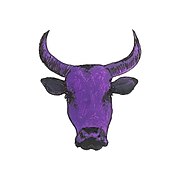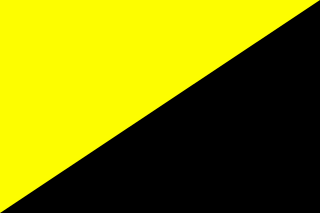
Anarcho-capitalism is an anti-statist, libertarian political philosophy and economic theory that seeks to abolish centralized states in favor of stateless societies with systems of private property enforced by private agencies, based on concepts such as the non-aggression principle, free markets and self-ownership. Anarcho-capitalist philosophy extends the concept of ownership to include control of private property as part of the self, and, in some cases, control of other people as private property. In the absence of statute, anarcho-capitalists hold that society tends to contractually self-regulate and civilize through participation in the free market, which they describe as a voluntary society involving the voluntary exchange of goods and services. In a theoretical anarcho-capitalist society the system of private property would still exist, as it would be enforced by private defense agencies and/or insurance companies selected by property owners, whose ownership rights or claims would be enforced by private defence agencies and/or insurance companies. These agencies or companies would operate competitively in a market and fulfill the roles of courts and the police, similar to a state apparatus. Some anarcho-capitalist authors have argued that slavery is compatible with anarcho-capitalist ideals.

Lysander Spooner was an American abolitionist, entrepreneur, lawyer, essayist, natural rights legal theorist, pamphletist, political philosopher, Unitarian and writer often associated with the Boston anarchist tradition.

The South African Communist Party (SACP) is a communist party in South Africa. It was founded in 1921 as the Communist Party of South Africa (CPSA), tactically dissolved itself in 1950 in the face of being declared illegal by the governing National Party under the Suppression of Communism Act, 1950. The Communist Party was reconstituted underground and re-launched as the SACP in 1953, participating in the struggle to end the apartheid system. It is a member of the ruling Tripartite Alliance alongside the African National Congress and the Congress of South African Trade Unions (COSATU) and through this it influences the South African government. The party's Central Committee is the party's highest decision-making structure.
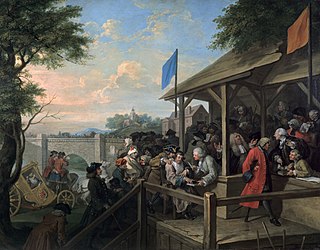
Political colours are colours used to represent a political ideology, movement or party, either officially or unofficially. They represent the intersection of colour symbolism and political symbolism. Politicians making public appearances will often identify themselves by wearing rosettes, flowers, ties or ribbons in the colour of their political party. Parties in different countries with similar ideologies sometimes use similar colours. As an example the colour red symbolises left-wing ideologies in many countries, while the colour blue is often used for conservatism, the colour yellow is most commonly associated with liberalism and right-libertarianism, and Green politics is named after the ideology's political colour. The political associations of a given colour vary from country to country, and there are exceptions to the general trends, for example red has historically been associated with Christianity, but over time gained association with leftist politics, while the United States differs from other countries in that conservatism is associated with red and liberalism with blue. Mass media has driven a standardization of colour by political party, to simplify messaging, while historically the colour a candidate chose to identify with could have been chosen based on other factors such as family or regional variations.
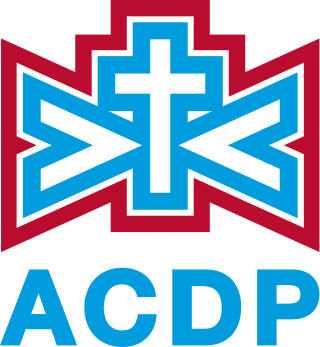
The African Christian Democratic Party (ACDP) is a South African political party founded in 1993. It is a conservative Christian party based on Biblical principles. The leader of the party is Kenneth Meshoe.

The Pan Africanist Congress of Azania is a South African national liberation Pan-Africanist movement that is now a political party. It was founded by an Africanist group, led by Robert Sobukwe, that broke away from the African National Congress (ANC) in 1959, as the PAC objected to the ANC's "the land belongs to all who live in it both white and black" and also rejected a multiracialist worldview, instead advocating a South Africa based on African nationalism.
Elections in South Africa are held for the National Assembly, provincial legislatures and municipal councils. Elections follow a five-year cycle, with national and provincial elections held simultaneously and municipal elections held two years later. The electoral system is based on party-list proportional representation, which means that parties are represented in proportion to their electoral support. For municipal councils there is a mixed-member system in which wards elect individual councillors alongside those named from party lists.
Right-libertarianism, also known as libertarian capitalism, or right-wing libertarianism, is a libertarian political philosophy that supports capitalist property rights and defends market distribution of natural resources and private property. The term right-libertarianism is used to distinguish this class of views on the nature of property and capital from left-libertarianism, a type of libertarianism that combines self-ownership with an egalitarian approach to property and income. In contrast to socialist libertarianism, right-libertarianism supports free-market capitalism. Like most forms of libertarianism, it supports civil liberties, especially natural law, negative rights, the non-aggression principle, and a major reversal of the modern welfare state.

Navanethem "Navi" Pillay is a South African jurist who served as the United Nations High Commissioner for Human Rights from 2008 to 2014. A South African of Indian Tamil origin, Pillay was the first non-white woman judge of the High Court of South Africa. She has also served as a judge of the International Criminal Court and President of the International Criminal Tribunal for Rwanda. Her four-year term as High Commissioner for Human Rights began on 1 September 2008 and was extended an additional two years in 2012. In September 2014 Prince Zeid bin Ra'ad succeeded her in her position as High Commissioner for Human Rights. In April 2015, Pillay became the 16th Commissioner of the International Commission Against the Death Penalty. She is also one of the 25 leading figures on the Information and Democracy Commission launched by Reporters Without Borders.
Although the Democratic Alliance of South Africa in its present form is fairly new, its roots can be traced far back in South African political history, through a complex sequence of splits and mergers.

The Cape Independence Party (CAPEXIT), previously called the Cape Party, is a political party in South Africa which seeks to use all constitutional and legal means to bring about Cape independence, which includes the entire Western Cape, Northern Cape, six municipalities in the Eastern Cape, and one municipality in the Free State. The area includes all municipalities in those provinces with an Afrikaans-speaking majority. In 2009, it was claimed to have had a membership of approximately 1,000 people across South Africa, but official membership figures are not made public. The party currently holds two seats on the Cape Town City Council.
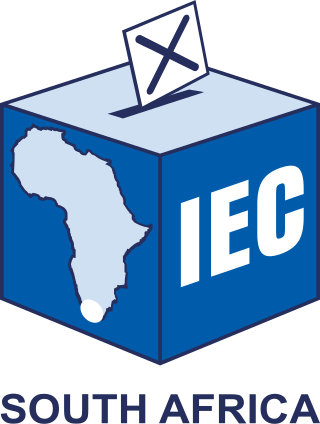
The Electoral Commission of South Africa is South Africa's election management body, an independent organisation established under chapter nine of the Constitution. It conducts elections to the National Assembly, provincial legislatures and municipal councils.
South Africa is a secular state, with freedom of religion enshrined in the Constitution.

The Workers and Socialist Party (WASP) is a Marxist and Trotskyist political party in South Africa affiliated to International Socialist Alternative.

The Economic Freedom Fighters (EFF) is a South African Marxist–Leninist and black nationalist political party. It was founded by expelled former African National Congress Youth League (ANCYL) President Julius Malema, and his allies, in 2013. Malema is President of the EFF, heading the Central Command Team which serves as the central structure of the party. It is currently the third-largest party in both houses of the South African Parliament. The party is also the official opposition in three of South Africa's nine provincial legislatures.
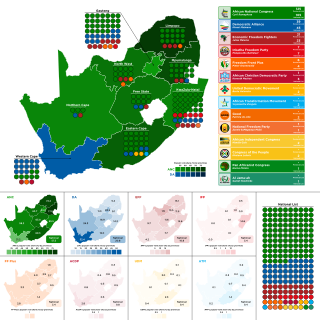
General elections were held in South Africa on 8 May 2019 to elect a new President, National Assembly and provincial legislatures in each province. These were the sixth elections held since the end of apartheid in 1994 and determined who would become the next President of South Africa.

The Electoral Commission of South Africa (IEC) announced on 20 March 2019 that a record number of 48 parties had registered candidates for the national parliamentary election. This is 19 more parties that contested the 2014 national elections. In the provincial legislature elections, the total number of parties registering candidates were:

The Democratic Liberal Congress (DLC) is a South African political party formed in 2016 by Patrick Pillay.

ActionSA is a South African political party established by a former mayor of Johannesburg, Herman Mashaba, soon after he left the Democratic Alliance.
